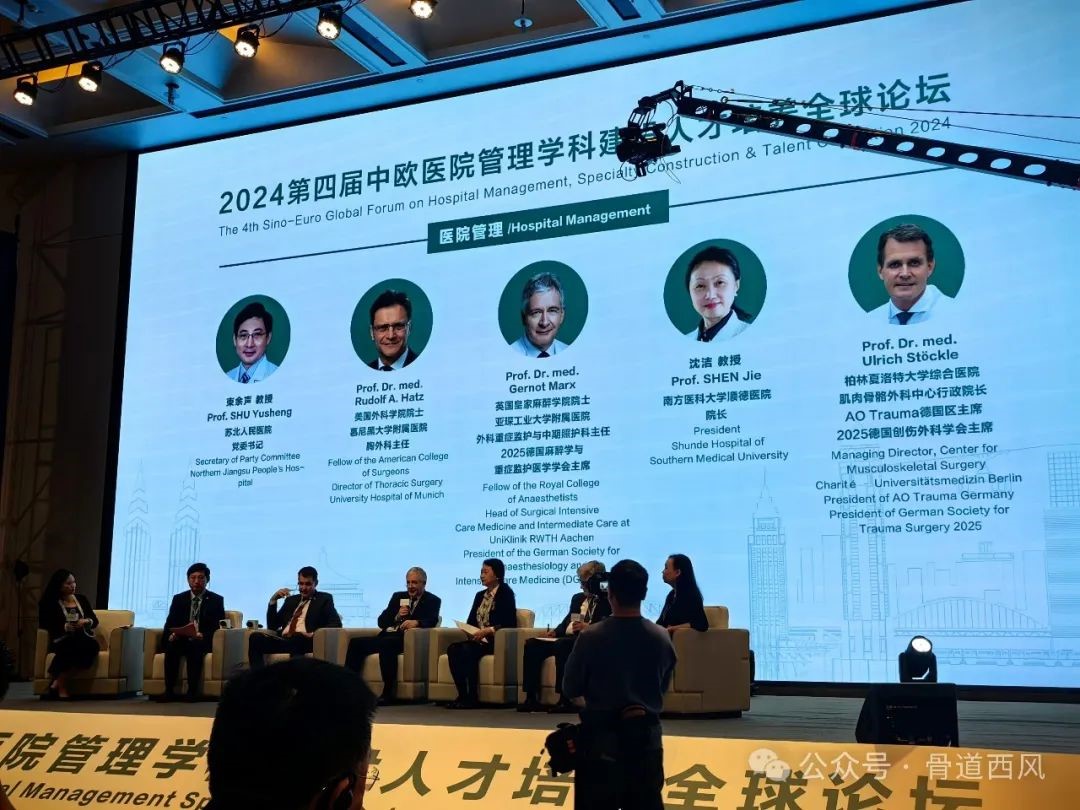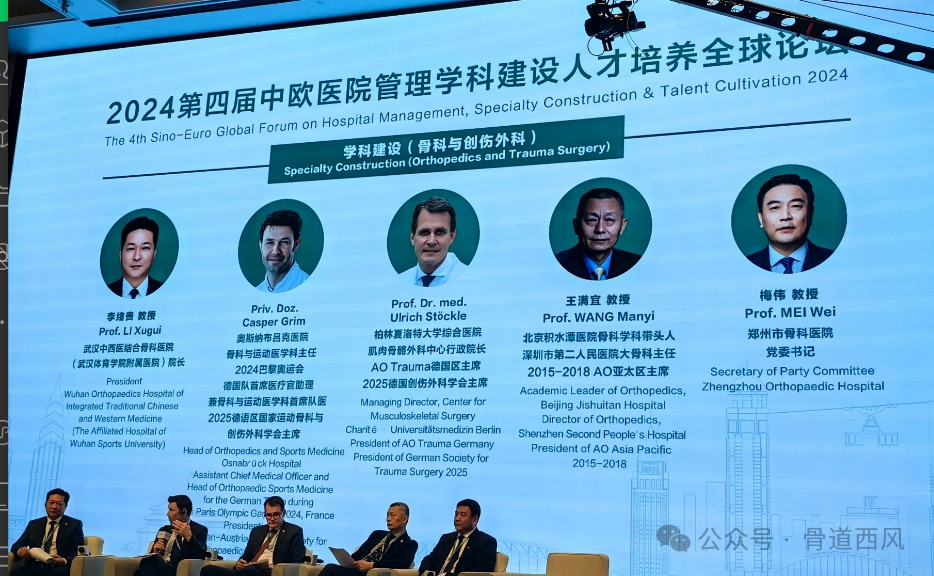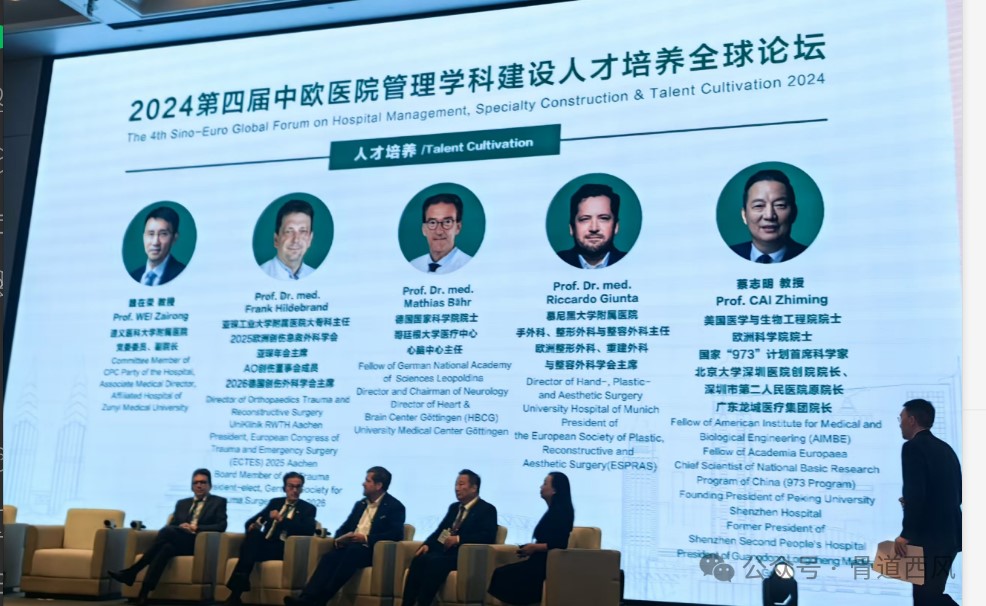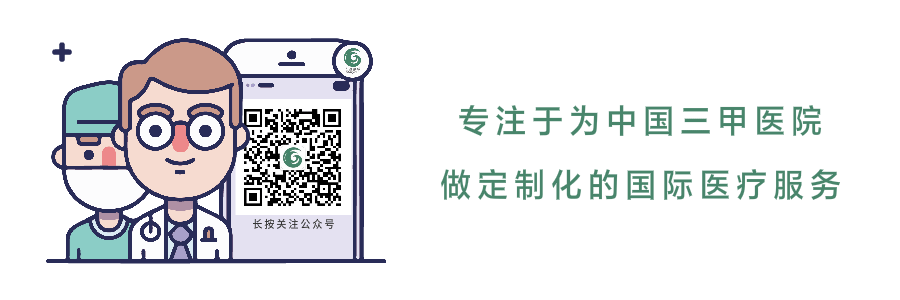-
News & Events

The 4th Sino-Euro Global Forum on Hospital Management, Specialty Construction & Talent Cultivation was held in Chongqing, attracting eight key academic leaders from Europe and over 300 attendees from 60 Grade III Class A hospitals across 41 cities in China, including hospital medical directors, academic leaders, department heads, and excellent young doctors. The forum was supported by simultaneous interpretation in Chinese and English.
Hospital Management
Prof. SHEN, President of Shunde Hospital, Southern Medical University, shared insights on the significance and operational approach of the Sanming mode. She emphasized that hospital management should be driven by value, fostering a sense of reliance, trust, and belonging among staffs. As an example, even during the pandemic, her hospital continued to send doctors abroad for study and exchange, aiming to fulfill individual aspirations—Maslow’s highest level of human need: self-actualization. Through extensive positive collaboration, her hospital has ascended to rank the second place in Foshan city, 21st in Guangdong province and 107th domestically. Prof. SHEN underscored the importance of cultural values, prioritizing care for employees. With a patient-first and employee-centered philosophy, she stated: "When employees are happy, patients are happy. When employees feel safe, patients are safe."
Prof. SHU, Secretary of the Hospital Party Committee, Northern Jiangsu People’s Hospital, highlighted that effective hospital management hinges on its staffs, with doctors playing the most crucial role. "In our hospital," he noted, "doctors are the foundation." He elaborated on various strategies to strengthen team cohesion and support, such as personal discussions with new hires, celebrating milestones, and encouraging participation in community events. To ensure professional growth, doctors studying abroad continue to receive full compensation, reflecting the hospital's commitment to their development. Prof. SHU concluded with the hospital's outstanding performance: consistently ranked first in the region for five consecutive years and boasting 266 doctoral degree holders among its staff. He stressed: "Satisfied staffs lead to satisfied patients; dissatisfied staffs will surely result in dissatisfied patients."
Juin Peng, Founder of Gloryren, stressed the importance of valuing doctors and genuinely listening to their voices. She cautioned against creating an environment where administrative departments overshadow medical professionals. "Administrative departments should serve doctors, not the other way around," She remarked, emphasizing that administrators must recognize their salaries come from the hard work of medical staff. Quoting Prof. Stief, Director and Chairman of Urology of University Hospital of Munich, he stated: "I am here to serve my staffs." She urged hospital administrators to adopt this mindset to foster a respectful and efficient working environment, warning that a failure to do so would lead to a hospital’s eventual decline.

Prof. SHU, Secretary of Hospital Party Committee of Northern Jiangsu People’s Hospital, discussed the goals of the Sanming mode, focusing on improving service capacity, technical proficiency, and addressing systemic challenges such as aligning hospital, insurance, and pharmaceutical sectors. He shared insights on cost efficiency, highlighting the hospital's average inpatient cost of 14,000 CNY and outpatient cost of 400 CNY, with over 1,000 thoracic surgeries performed annually. He stressed the need for tailored strategies to ensure long-term success of hospitals across different regions and institutions.
Key Takeaways from German Experts
The German experts echoed Prof. SHEN's and other hospital leaders' perspectives. They emphasized that the success of hospital management lies in prioritizing staffs’ well-being, as this directly impacts patient satisfaction. They highlighted the importance of personal development and career planning for doctors and fostering a shared sense of values and mission among all staffs. Through strategic planning, team-building activities, and training, they underscored the importance of creating a cohesive, motivated workforce. Strategic direction and departmental alignment, they concluded, are essential for effective execution and achieving organizational goals.
Specialty Construction
1. The aging population
Prof. WANG Manyi, Academic Leader of Beijing Jishuitan Hospital, spoke on behalf of grassroots healthcare workers, addressing the challenges posed by the aging population, with those aged 60 and above constituting 8% of the total population—indicating the onset of an aging society. He emphasized that elderly people, having once contributed to society, create certain pressures on society once they retire. Ten years ago, while at Jishuitan hospital, he initiated the "Sailing Plan," which received government investment of 3 million CNY to establish an orthopedic ward for the elderly. The government placed great importance on this, and the plan won national recognition. He shared how orthopedic and internal medicine doctors worked together in the same department—a model that was once considered unimaginable but proved successful with the support of internal medicine specialists. He could rely on retired internal medicine doctors to ensure patient safety. Additionally, young doctors were rotated, and in cases involving diabetes or cardiovascular diseases, internal medicine doctors contributed by writing articles from the internal medicine perspective. This interdisciplinary approach not only facilitated research but also enabled publication in scientific journals. Prof. WANG also convinced the head of internal medicine to integrate internal medicine doctors into the geriatrics team. Currently, the ward has 50 beds, with an average hospital stay of 4.2 days and a mortality rate of 4% for patients over 65 with femoral neck fractures. New patients are given a fast-track treatment pathway, with emergency doctors performing assessments and surgeries within 48 hours. The elderly care ward is managed by internal medicine doctors, while orthopedic specialists are only responsible for surgery. After surgery, patients are transferred back to the geriatrics ward. He concluded by emphasizing the importance of team collaboration, where each specialty plays to its strengths, enabling the team to focus on delivering successful outcomes, especially in challenging and critical cases.
Prof. MEI Wei, Secretary of Hospital Party Committee of Zhengzhou Orthopaedic Hospital, highlighted that by 2021, the elderly population over 65 in China reached 200 million, accelerating the aging process by four years. In orthopedics, elderly patients often suffer from fractures accompanied by multiple comorbidities, requiring a multidisciplinary approach to management. He praised the model established by Tianjin Hospital, where internal medicine doctors also play a key role in elderly patient management. However, he noted that specialized orthopedic hospitals still face challenges in terms of internal medicine strength compared to comprehensive hospitals, which remain an inevitable reality for specialty hospital development.
Prof. WANG Manyi added that early intervention and prevention are crucial for some diseases. By registering the basic health information of elderly patients and implementing early intervention measures, the incidence of fractures in the elderly can be significantly reduced.
Prof. LI Xugui, President, Wuhan Orthopaedics Hospital of Integrated Traditional Chinese and Western Medicine (The Affiliated Hospital of Wuhan Sports University), pointed out that his hospital a comprehensive hospital with a focus on traditional Chinese medicine, stressed that the number of elderly people in China is projected to reach 500 million in the next ten years. He advocated for a multidisciplinary approach in clinical treatments, highlighting the importance of adapting medical techniques to the aging process. He also emphasized a holistic approach to healthcare—prevention, treatment, and rehabilitation—to keep patients healthy and minimize disease occurrence.
Key Takeaways from German Experts
The German experts acknowledged that Germany faces similar challenges, particularly regarding doctor shortages. They highlighted the baby boom between 1945 and 1965, which led to a demographic gap in the following years. Issues such as declining birth rates and aging populations are pressing concerns worldwide. However, Germany benefits from a relatively robust healthcare system that meets most citizens’ medical needs. The experts stressed the importance of involving internal medicine specialists in multidisciplinary consultations in an aging society. While internal medicine specialists may not fully understand surgical procedures, and surgeons may lack expertise in internal medicine management, collaborative communication and discussion between the two specialties are crucial to improving team service capabilities and ultimately benefiting patients.
2. The establishment of trauma network
Prof. WANG Manyi stated that the network is just a tool; the most important factor is the government's emphasis on it. Any hospital's president aiming to establish an emergency system will inevitably face financial challenges. Ten years ago, at Beijing Jishuitan Hospital, there were 30 patients with an ISS score greater than 16. If a patient requires consultation from 30 departments, it will definitely result in a loss.
First, for a country to establish an emergency system, relying on a single hospital is simply insufficient. It requires participation from many sectors, including automobile clubs, motorcycle clubs, and traffic departments. The reason why Prof. JIANG Baoguo is well-known and won a national award is that he established the transportation system and introduced regulations.
Second, the government is beginning to lay the foundation, such as selecting one center in the southern region. However, many institutions are unwilling to get involved if the government provides funding all at once because emergency systems are very costly.

Prof. LI Xugui mentioned that his hospital’s ambulances are stationed on-site, each equipped with GPS, but they are not under the hospital’s direct control. There is a large screen that displays the number of available emergency vehicles, and when a need arises, ambulances are dispatched from the nearest location.
Prof. MEI Wei said the establishment of a trauma network benefits patients. Creating such a network is the trend. It is not feasible for one hospital or even a few cities to handle this alone. Currently, economically developed cities are implementing this system, and it will be further expanded as the network matures in the future.
Key Takeaways from German Experts
The German experts said in Germany, there already is a tiered trauma network of three levels, with patients being admitted to a hospital within 30 minutes of receiving the call. This network was planned 20 years ago, involving local medical facilities, regional hospitals, and university hospitals (for complex cases). When an accident occurs, patients are assigned to the nearest trauma center, with each level of trauma center clearly marked. Each trauma center is staffed by 2-3 medical professionals at a time, rather than handling 10 patients at once. This method is designed to disperse care, ensuring optimal use of resources and maximizing emergency efficiency. The establishment of this trauma network prepares hospitals for unpredictable incidents, such as wars, which may occur unexpectedly. By planning and rehearsing in advance, doctors know the longest time it will take to reach the nearest treatment center, which enables them to respond effectively when the unexpected happens. The purpose of the network is to send the right patients to the right hospital. Specialists focus on specific fields: orthopedic surgeons concentrate on joint surgery, arthroscopists focus on arthroscopy, and trauma surgeons focus entirely on trauma care. This allows the entire team to leverage their strengths to the fullest, benefiting the public significantly.
Question:In Germany, have you encountered the same issues as in China, such as hospitals competing for patients with serious conditions, where everyone wants to admit the patient to their own hospital? How do hospitals compete with each other?
Answer form German side:We have professional group discussions, and each region has a scheduled rotation. For example, one hospital will be on call on certain days. Additionally, all of our information is shared. When facing complex cases, we have discussions and consultations, with full communication and cooperation, ensuring that patients are sent to the most appropriate hospital. The emphasis in our trauma network is on cooperation rather than competition between the team members.
3. Training of grassroots doctors
Prof. WANG Manyi emphasized that currently, doctors in large hospitals are required to spend six months working in grassroots hospitals for promotion. There are three sub-centers nationwide—Henan, Guizhou, and Shandong—with one center overseeing three hospitals. The head of each center is responsible for managing it like a corporation, driving medical development in the respective provinces. Relying solely on external development is not sustainable. To elevate grassroots hospitals, they must build upon the achievements of established institutions. A grassroots hospital may be early to adopt certain practices, but without forward-thinking, others will eventually surpass them by summarizing experience and gradually improving. For example, bringing advanced German technology to local hospitals, setting high standards for training young talent. While there is no shortage of talent in grassroots hospitals, their focus is often narrow, primarily on earning a living without broader ambitions. Prof. WANG mentioned that he personally mentors five PhD students; when he tells them what to do, they automatically figure out how to proceed without needing constant supervision. Grassroots doctors, however, tend to remain limited by the mindset they had in high school.
Prof. LI Xugui pointed out that there is a gap in the thinking between grassroots doctors and those in larger cities. He noted that pushing advanced technology down to the grassroots level is closely linked to the government’s emphasis on strengthening grassroots healthcare. To improve the skills of grassroots doctors, the government must allocate funding and increase the incentives for these doctors. Enhancing the capabilities of tier-three hospitals requires improving the average level of healthcare across the country. By ensuring that medical resources flow down to grassroots hospitals, more people can benefit from better healthcare services.
Prof. MEI Wei highlighted several challenges facing grassroots hospitals, including issues with compensation and patient volume. Often, doctors in these hospitals cannot see enough patients, hindering their ability to improve their skills. He emphasized the importance of training doctors over a set period, rather than just assessing their abilities through examinations. It is crucial to allow more doctors to rotate through large hospitals to gain experience treating more patients. When they return to grassroots hospitals, even if they cannot handle complex cases, they will at least know the next steps in treatment. Without this experience, patients may be mismanaged, and by the time they reach larger hospitals, the condition could be worse. Prof. MEI stressed that support for grassroots hospitals should come from a strategic perspective, ensuring that the doctors are secure in their roles. Strengthening supervision is key to making sure the initiative is not undermined. The cost of training for grassroots doctors is high, and since their salaries are already low, this often isolates them from more advanced learning opportunities.
Question:Currently, Henan Provincial Orthopedic Hospital (Luoyang Orthopedics Hospital) has 123 departments, 3,100 beds, 1,400 of which are for non-surgical treatment. Are there many non-surgical patients in Europe as well? Is there room for cooperation in traditional medical practices such as manual reduction and conservative fracture treatment?
Answer form German side:In Germany, there are many patients treated conservatively. Chinese Medicine plays a significant role in pain management and preventive healthcare. In the next decade, this area will be a focus of development.
Summery
Prof. MEI Wei noted that many doctors focus primarily on treatment, with little attention given to prevention. He emphasized the importance of giving greater attention to the living environment, as elderly people often lack the ability to prevent accidents. He called for society to be more engaged in various aspects of healthcare. Many patients fall in places like bathrooms or bedrooms due to insufficient preventive measures. Training grassroots doctors will benefit many aspects, such as improving their treatment capabilities and ensuring standardized care. Clinical pathways play a crucial role in standardizing treatment. In addition to medical education, it is vital to apply learned knowledge in clinical practice. There should be more focus on supporting grassroots doctors by providing them with time and space to mentor young doctors.The establishment of trauma networks is an inevitable path for future development. Improving patient treatment capabilities will benefit many, and this requires greater attention from society.
Talent Cultivation
1. Does talent recruitment consider the QS ranking? Is the QS ranking fair?
Prof. CAI Zhiming, Founding President of Peking University Shenzhen Hospital, Former President of Shenzhen Second People's Hospital, President of Guangdong Longcheng Medical Group, said scientific research and education in China are not as good as those abroad, which is a short plank of ours. In our country, there are many patients and abundant cases, but our research capabilities are weaker than those abroad. This is something we have to admit. Regarding the QS ranking, he think it's not about whether it's fair or not, but whether you can climb that rank. If you can't, what should you do about it?
Prof. WEI Zairong, Committee Member of Secretary of Hospital Party Committee, Affiliated Hospital of Zuni Medical University, mentioned that rankings should be considered, but personal interviews (of the talents) are also very important. The key thing is that during recruitment, human resources should ask candidates what their personal aspirations are. If they share the same values, even if their performance is slightly lacking, they can still integrate into the team. We will support them, and it’s okay if they move slowly as long as they are heading in the right direction in the long term.
German Experts (Summary): The QS ranking has some value, but it should not be the only criterion for recruitment. Talent requires basic skills, and while academic ability is important, social skills, communication ability, and teamwork are also crucial. Furthermore, an open mindset is essential—one cannot close oneself off. My first stop in China was Wuhan, where the doctors had excellent English, and our communication was smooth. The subsequent collaboration benefited both sides, which was very positive. This highlights the need for talent to be proficient in English, otherwise, they cannot truly engage with the world.
2. How to Retain Talent?
German Experts (Summary):
When recruiting talent, it is essential to be clear about the type of person you want to hire. For example, if someone has strong academic credentials but lacks surgical skills, and the hospital needs a surgeon at that moment, hiring this person would be a loss for both sides. Their talents would be underutilized, and the hospital's position would be wasted. Therefore, during recruitment, it is crucial to ensure that the candidate is passionate about the job, not just focused on salary. While salary is important, the ability to utilize one's talents and express personal value in the workplace is more important. Over time, the needs of employees will evolve. A worker with one year of experience may have different needs from someone with ten years of experience. Leaders must regularly track the demands of employees and avoid restricting their development. Talent loss is a global issue, and many individuals move to other countries for work. If their needs are not met, long-term frustration will lead them to leave. This rule applies universally.
When recruiting, it is important to ask candidates why they are applying for the job. If the candidate is not very talkative but has excellent technical skills, the role should focus on their technical capabilities. Interviews should be conducted individually, as resumes may not always be truthful.

Regarding talent management, Prof. CAI Zhiming highlighted three key aspects: cultivation, recruitment, and utilization. He once advised the government that the key to retaining talent is to win their hearts. Only the person wearing the shoes knows if they fit. He identified four main reasons for employee turnover: First, whether they feel respected and valued. If employees are not recognized in their workplace and bureaucratic practices prevail, they will become disappointed and leave. Second, whether their career development aligns with the organization's vision. The hospital’s conditions, policies, department status, and interpersonal relationships affect employee satisfaction. If employees see no opportunities for promotion in their roles, they will feel frustrated and ultimately leave. Third, compensation is important, but it is not the most crucial factor. Fourth, support systems, such as the employment of a spouse, schooling for children, and proximity to aging parents. By retaining staffs’ hearts, they will overcome many challenges and choose to move forward with the organization.
3. Cultivating Young Talent to Become Leaders
Juin Peng: As a hospital director, it is essential to understand the needs of young doctors, especially those born in the 1990s and 2000s. They desire happiness, future prospects, and competitive compensation, not just empty promises or unattainable goals. The role of the director is to offer them a future, benefits, and opportunities for growth, rather than just setting unrealistic expectations or barriers.
As a hospital director and department head, one must have the ability to spot potential in doctors and nurses. Prof. CAI Zhiming shared a story about a young doctor in his 20s who called him late at night with an idea for an article on a bladder cancer patient. Prof. CAI recognized the young doctor's talent and research ability. He then took the young doctor to meet the mayor and recommended him, despite his junior position. Prof. CAI made the case that his performance was equivalent to a senior doctor’s, and after the mayor’s assessment, the young doctor was promoted. Even when the doctor was still a graduate student, Prof. CAI gave him a position as deputy director. When he worked as a deputy director, he demonstrated a unique approach by posting problems in the restroom and solving them one by one. Prof. CAI saw his talent and recognized that it was his duty as a leader to promote capable individuals who could surpass him, as failing to do so would result in stagnation in leadership development.
Juin Peng: A doctor must not only have solid medical skills but also ambition, vision, and grand goals.
Prof. CAI: Hospital directors and department heads must focus on training and promoting younger talent who are more capable than themselves. As members of the older generation, we must step aside and allow the younger talent to surpass us.
Summary
Prof. SHU Yusheng perceived this forum as a very rewarding one, as it discussed hospital management, discipline development, and talent cultivation in layers. The directors and party secretaries of the hospitals have all risen from the positions of department heads. We know that the key to hospital development is talent. Many experts have come to China. Although the mechanisms are different, we have opened our minds and found common ground, sharing a common goal: patient-centered and safety-centered care. With our hearts in unison and efforts combined, we had an open and pleasant exchange. This made the meeting not just a formality, but both lofty and down-to-earth.
Next year, we will have a deeper understanding of these three topics. The most discussed topic will be reform. How will we deepen the reform? The core of reform is innovation!
Looking forward to the 5th forum next year!
Let me share a small story: When WU Qi (Leading figure of Militarist School in ancient China, living in 440B.C. -381 B.C.) served as a general, he shared the same food and clothing with the lowest-ranking soldiers, personally tending to wounds and sharing the burdens of food and labor. One day, a soldier developed a severe abscess, and General WU sucked out the pus in his wound. This act reached the soldier's mother, who wept uncontrollably. She recalled that General WU had once sucked out the poison from her father's wound, which led to his death in battle. Now, he was doing the same for her son, and she feared her son would meet the same tragic fate.
Finally, I would like to say, if a ruler treats his ministers as his own limbs, the ministers will treat the ruler as their own heart; if a ruler treats his ministers as mere dogs and horses, the ministers will treat the ruler as just another citizen; if a ruler treats his ministers as worthless, the ministers will treat the ruler as an enemy.
Hospital leaders must pay attention to the voices of doctors! If you value doctors, you must also value their words.
As long as the spark remains, there is hope for Chinese healthcare!
In 2024, may Chinese healthcare continue to thrive!
November 17, 2024
Written on the high-speed railway from Chongqing to Nanyang
